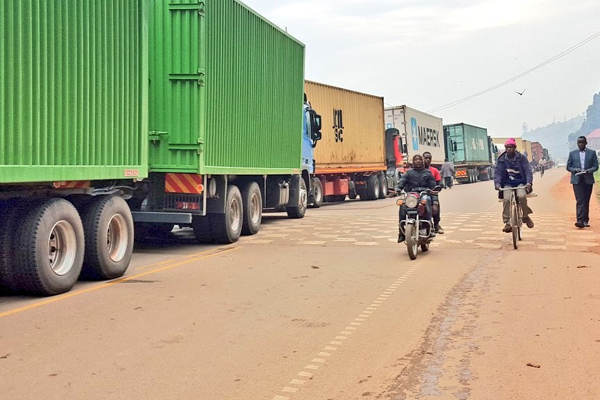Prime
Private sector wants EAC govts to end tax disputes

There has been a number of border conflicts that have resulted in the blockade of certain goods from entering EAC partner states. PHOTO | FILE
Businesses across the region and the private sector under the East African Business Council have asked Heads of State and government to end domestic tax disputes that continue to affect trade.
The demand is one of the several that the business council wants the East African Head of States to resolve during deliberations in the 21st Ordinary Summit expected this Saturday.
Others issues, according to the East African Business Council, include conclusion of the comprehensive review of the EAC Common External Tariff and chatting ways through which the region will tap into the African Continental Free Trade Area.
Dr Peter Mutuku Mathuki, the East Africa Business Council chief executive officer, told Daily Monitor, the EAC heads of state should direct relevant government bodies to fast track bilateral and diplomatic engagements to solve persistent trade disputes and non-tariff barriers as well as finalising the operationalisation of the EAC Trade Remedies Committee to improve intra-EAC trade and economic resilience.
Trade disputes continue to crowd trade across the region with some countries warning of serious repercussions that might result into retaliation and court intervention.
Uganda has already warned that it will seek court intervention if the EAC Heads of State summit fails to resolve trade issues particularly with Kenya and Tanzania.
Mr Emmanuel Mutahunga, the Ministry of Trade commissioner external trade, early this week told Daily Monitor that the Ugandan government had been engaging and will continue to engage member states to solve the trade wars, with a further push expected during the during the ongoing EAC Summit.
However, he noted that if no solution is reached, Uganda will take the disputes to the East African Court of Justice for redress.
Tax disputes have caused a number of issues leading to blockades that go against the EAC trade protocols.
However, some media reports have indicated that Uganda and Kenya have agreed in principle on agreements that could put an end to persistent trade dispute facing the two countries.
Under the agreement, according to The East African, Uganda will relax duty on Kenyan fruit juices and verification fees on pharmaceuticals in exchange for increased sugar export quotas to Kenya.
In March 2020, Finance Minister Matia Kasaija tabled the Excise Duty (Amendment) Bill, in which he provided that fruit and vegetable juices (except juice made from at least 30 per cent pulp from fruit and vegetables grown in Uganda) would attract 12 per cent tax or Shs250 ($0.06) per litre, whichever is higher.
This had been in disregard of an agreement in which there had been comprehensive discussions about taxes on juices, pharmaceuticals and milk products in December 2019.
Uganda had during the discussions committed to abolish contentious taxes by June 30, 2020 and provide an advance progress report by March 31, 2020. In return, Kenya had committed to lift the ban on Uganda’s exports of poultry products that had been imposed on February 14, 2019 as well as increase market access for Ugandan sugar to 90,000 metric tonnes from 30,000 metric tonnes, subject to verification by February 2020.
Kenya and Uganda had also agreed to subject a 16 per cent levy on milk exports from Uganda to protect Kenya’s market from dumping.
However, many of these have reminded on paper thus the East African Business Council has tabled a matrix of issues to the EAC Council of Ministers to be considered before the end of the summit.
Uganda, Kenya agree on taxes
A number of tax-related commitments between Uganda and Kenya have not be implemented, which continues to create problems for trade between the two countries.
However, according to Kenya’s Principal Secretary in the Ministry of Trade Johnson Weru, a Kenyan delegation led by the Ministry of Trade will visit Uganda in April to seal a deal that will increase the amount of Uganda’s sugar exports to Kenya beyond the 11,000 metric tonnes per annum the country has been allocated by the Common Market for Eastern and Southern Africa (Comesa) council of ministers.
In return, Kenya expects Uganda to abolish duty on Kenyan juices and pharmaceuticals that have made these products uncompetitive in the Ugandan market.
“On sugar, we have sorted out the issues they (Uganda) notified us about and most likely there will be a government delegation going to Uganda to check a few things. We have been invited and we are now constituting ourselves to go. This was a mutual invitation,” Mr Weru told The EastAfrican.
“There was a question of the sugar quota that they [Uganda] have been allocated by Comesa to export to Kenya. Now they seem to have more sugar to export than the quota they have been allocated. But you see, the quota is allocated by Comesa and not by Kenya. So they [Uganda] have invited us and we are going there as friends and they are saying you guys [Kenya] are our neighbours and you see we have been allocated less than what we have. Come and we discuss so that you [Kenya] can take slightly more than what is allowed in the quota and we have said yes we shall come and we shall agree on how much additional we shall take.”




